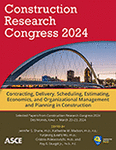Stabilizing Manufacturing Lines of Customized Building Mechanical Components under Uncertain Machinery Deterioration
Publication: Construction Research Congress 2024
ABSTRACT
In customized building mechanical component production, more frequent quality issues and maintenance activities caused by unexpected machine failures interrupt production and result in waste and delays. Integrating predictive maintenance strategies into manufacturing operations is necessary to solve this problem. However, under the uncertainties of machinery deterioration and uncertain productivity, existing literature lacks a quantifiable index for precise evaluation for measuring the stability of joint maintenance and production schedules. A significant challenge exacerbating this gap is the scarcity of production and maintenance data to infer these deterioration models accurately. As a result, current methods struggle to balance production goals with production machine maintenance needs, often leading to sub-optimal operational performance and increased machine downtime. This paper presents a joint maintenance and production scheduling framework that integrates data extraction and process mining to infer manufacturing line deterioration models. This framework generates stable maintenance coordination plans, considering uncertain customized products’ production schedules and machinery deterioration rates. It establishes the needed predictive maintenance using the deterioration models estimated from limited production and maintenance data. The production and predictive maintenance activities can be thus scheduled simultaneously to stabilize productivity and quality. The authors validated the proposed framework using data from a ventilation duct manufacturing line. The results illustrate that this framework can use limited production and maintenance data to produce reliable machine deterioration models that support stable joint maintenance and production scheduling.
Get full access to this article
View all available purchase options and get full access to this chapter.
REFERENCES
Akpudo, U. E., and H. Jang-Wook. 2021. “An Automated Sensor Fusion Approach for the RUL Prediction of Electromagnetic Pumps.” IEEE Access, 9: 38920–38933. https://doi.org/10.1109/ACCESS.2021.3063676.
An, Y., X. Chen, J. Hu, L. Zhang, Y. Li, and J. Jiang. 2022. “Joint optimization of preventive maintenance and production rescheduling with new machine insertion and processing speed selection.” Reliability Engineering & System Safety, 220: 108269. https://doi.org/10.1016/j.ress.2021.108269.
Atthajariyakul, S., and T. Leephakpreeda. 2004. “Real-time determination of optimal indoor-air condition for thermal comfort, air quality and efficient energy usage.” Energy and Buildings, Building Research and the Sustainability of the Built Environment in the Tropics, 36 (7): 720–733. https://doi.org/10.1016/j.enbuild.2004.01.017.
Barthelmey, A., E. Lee, R. Hana, and J. Deuse. 2019. “Dynamic digital twin for predictive maintenance in flexible production systems.” IECON 2019 - 45th Annual Conference of the IEEE Industrial Electronics Society, 4209–4214.
Buyurgan, N., and A. Mendoza. 2006. “Performance-based dynamic scheduling model for flexible manufacturing systems.” International Journal of Production Research, 44 (7): 1273–1295. Taylor & Francis. https://doi.org/10.1080/00207540500412016.
Cassady, C. R., and E. Kutanoglu. 2005. “Integrating preventive maintenance planning and production scheduling for a single machine.” IEEE Transactions on Reliability, 54 (2): 304–309. https://doi.org/10.1109/TR.2005.845967.
Chen, C., J. Shi, N. Lu, Z. H. Zhu, and B. Jiang. 2022. “Data-driven predictive maintenance strategy considering the uncertainty in remaining useful life prediction.” Neurocomputing, 494: 79–88. https://doi.org/10.1016/j.neucom.2022.04.055.
Ebner, K., and L. Koops. 2022. Potentials of Prognostics and Health Management for Polymer Electrolyte Fuel Cells in Aviation Applications. Aircraft Engineering and Aerospace Technology. https://doi.org/10.1108/AEAT-01-2022-0020.
Ji, M., Y. He, and T. C. E. Cheng. 2007. “Single-machine scheduling with periodic maintenance to minimize makespan.” Computers & Operations Research, Part Special Issue: Odysseus 2003 Second International Workshop on Freight Transportation Logistics, 34 (6): 1764–1770. https://doi.org/10.1016/j.cor.2005.05.034.
Jiang, Z., M. J. Risbeck, V. Ramamurti, S. Murugesan, J. Amores, and Y. M. Lee. 2021. “Deep Reinforcement Learning for Energy Cost Optimization in Building HVAC Systems.” ASHRAE Transactions, 127: 38–47. American Society of Heating, Refrigeration and Air Conditioning Engineers, Inc.
Jouhara, H., and J. Yang. 2018. “Energy efficient HVAC systems.” Energy and Buildings, 179: 83–85. https://doi.org/10.1016/j.enbuild.2018.09.001.
Okoh, C., R. Roy, and J. Mehnen. 2017. “Predictive Maintenance Modelling for Through-Life Engineering Services.” Procedia CIRP, Proceedings of the 5th International Conference in Through-life Engineering Services Cranfield University, 1st and 2nd November 2016, 59: 196–201. https://doi.org/10.1016/j.procir.2016.09.033.
Paprocka, I. 2019. “The model of maintenance planning and production scheduling for maximising robustness.” International Journal of Production Research, 57 (14): 4480–4501. Taylor & Francis. https://doi.org/10.1080/00207543.2018.1492752.
“U.S. HVAC Systems Market Size & Share Report, 2030.” n.d. Accessed July 27, 2023. https://www.grandviewresearch.com/industry-analysis/us-hvac-systems-market.
Vogl, G. W., B. A. Weiss, and M. Helu. 2019. “A review of diagnostic and prognostic capabilities and best practices for manufacturing.” J Intell Manuf, 30 (1): 79–95. https://doi.org/10.1007/s10845-016-1228-8.
Xu, L. D., W. He, and S. Li. 2014. “Internet of Things in Industries: A Survey.” IEEE Transactions on Industrial Informatics, 10 (4): 2233–2243. https://doi.org/10.1109/TII.2014.2300753.
Zhang, W., D. Yang, and H. Wang. 2019. “Data-Driven Methods for Predictive Maintenance of Industrial Equipment: A Survey.” IEEE Systems Journal, 13 (3): 2213–2227. https://doi.org/10.1109/JSYST.2019.2905565.
Information & Authors
Information
Published In
History
Published online: Mar 18, 2024
Authors
Metrics & Citations
Metrics
Citations
Download citation
If you have the appropriate software installed, you can download article citation data to the citation manager of your choice. Simply select your manager software from the list below and click Download.
